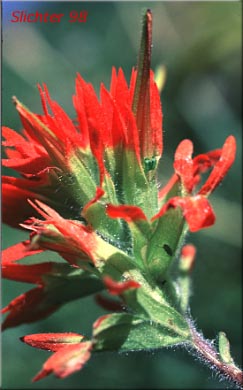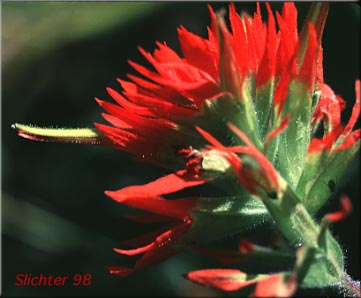 Photo at right of Suksdorf's
paintbrush from Trail #95, Goat Rocks Wilderness.......... August 30, 1998. Note
the prominent, long, thin galea with the short, green lower lip which may be seen
at the upper right side of the inflorescence!
Photo at right of Suksdorf's
paintbrush from Trail #95, Goat Rocks Wilderness.......... August 30, 1998. Note
the prominent, long, thin galea with the short, green lower lip which may be seen
at the upper right side of the inflorescence!
Suksdorf's paintbrush is a bright, showy wildflower of subalpine meadows which usually arises as solitary stems, usually reaching heights between 30 and 50 cm. The stems and leaves may be smooth or glabrous, but may also be somewhat hairy. Individual leaves are often entire and linear-lanceolate, with the upper leaves often being pitch for in shape due to one or two pairs of pointed lateral lobes (see photo below). These lateral lobes are usually nuch narrower than the mid- section of the leaf.
The inflorescence is at first short and thick, but elongates during the season. The bracts and calyces are marked with bright red, with a narrow band of yellow below the tips (see photos). The bracts are broadly 5-parted and are shorter than the flowers. The corolla is is 30 to 50 mm in length, and the galea is much longer than the short, stubby green lower lip (see photo at right).
Prominent features to aide identification include the long galea in comparison to the short, green lip, and the narrow band of yellow below the bright red tips of the bracts and calyces.
Suksdorf's paintbrush is named after the well-known student of southern Washington wildflowers, Wilhelm Nikolaus Suksdorf, who spent much time studying the flowers of the Columbia River Gorge and of Mt. Adams.Suksdorf's paintbrush is found in very moist subalpine meadows, especially near springs or along small streams.
Suksdorf's paintbrush is found in the Cascade Mountains from Mount Adams, Washington in the north to Crater Lake, Oregon in the south.
 -
- 